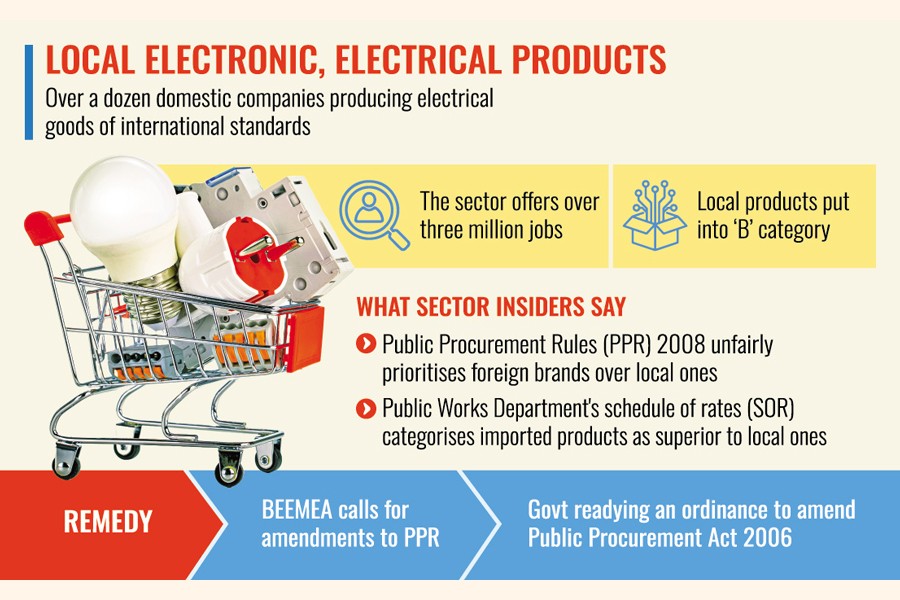Local electrical items overlooked in govt procurement
Claim businesses, seek review of rules to ensure fair play

Published :
Updated :

Electrical and home appliance entrepreneurs have sought equal and fair treatment of domestically-produced goods in government procurements to expand their market and also reduce the pressure on foreign exchange reserves by cutting import dependency.
The Bangladesh Electrical, Electronics and Home Appliances Manufacturers and Exporters Association (BEEMEA) has described the existing public procurement act and the public procurement rules as biased towards foreign electrical products and demanded their amendments in a recent letter to the commerce ministry.
The ministry forwarded the letter to the planning ministry with recommendations to amend the act accordingly.
"Through the dedicated efforts of local entrepreneurs, international-standard factories equipped with state-of-the-art machinery are now producing a wide range of products," said the letter.
However, certain provisions in the procurement rules have enforced reliance on imports of such products, which is obstructing the domestic industry's growth and the expansion of local entrepreneurship, it said.
"Over a dozen domestic companies are producing electrical goods of international standards, but the Public Works Department has put local products in the 'B' category," said SM Shoyeb Hossain Nobel, executive member of BEEMEA.
Such prioritisation of foreign products in the government document undermines the value, quality, and perception of locally-made goods, he added.
He also said this sector now has over three million jobs, while equal access in public procurement would help increase employment and income by reducing import costs as well as the pressure on forex reserves.
The letter highlighted that Bangladesh has become self-sufficient in producing electrical and electronic items like air-conditioners, refrigerators, televisions, and mobile phones. These products are environment-friendly, produced using state-of-the-art machinery, meet international standards, and affordable for local consumers.
The association pointed out that domestic manufacturing has saved foreign currency by reducing imports and also resulted in earnings through exports.
It criticised the misuse of the Public Procurement Rules (PPR) 2008 provision, which unfairly prioritises foreign brands over local ones.
The Public Works Department's schedule of rates (SOR) was also criticised for categorising imported products as superior to local ones, regardless of quality.
This categorisation creates a bias in favour of foreign brands, leading to higher government expenditure on imports instead of supporting the local industry, noted BEEMEA.
It said these practices directly violate the government's industrial policy, which promotes domestic industries to reduce import dependency.
To address these issues, the association called for amendments to the PPR to prioritise domestic products in government procurement tenders.
It also urged the government to revise the SOR and ensure fair recognition of local products by eliminating the bias against domestic brands.
The association also proposed issuing a statutory regulatory order (SRO) by mandating priority for quality domestic products in public procurement.
It stressed that the existing procurement rules are outdated as Bangladesh is no longer dependent on imports for many products.
Besides, it argued that these outdated policies hinder industrial growth and increase unnecessary government spending on imported goods.
The letter appealed for timely action to create a level playing field that supports domestic industries in competing fairly in public procurement.
A high official of the commerce ministry said the ministry has a soft corner for the association's appeal, which is why it forwarded the letter to the planning ministry.
An official of Bangladesh Public Procurement Authority (BPPA) said the government is preparing an ordinance to amend the public procurement act 2006.
BPPA may consider the BEEMEA letter, he added.
jahid.rn@gmail.com


 For all latest news, follow The Financial Express Google News channel.
For all latest news, follow The Financial Express Google News channel.